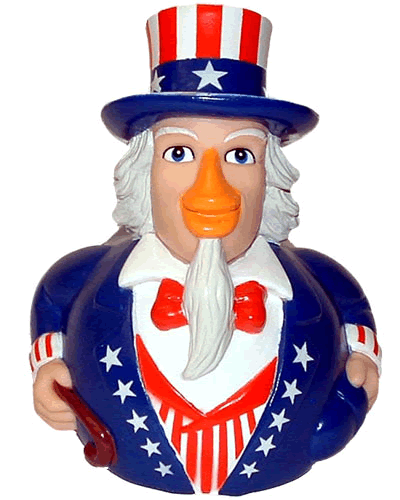|

Uncle Sam Rubber Duck
Common folklore holds origins trace back to
soldiers stationed in upstate
New
York, who would receive barrels of meat stamped with the
initials U.S. The soldiers jokingly referred to it as the initials
of the troops' meat supplier,
Samuel Wilson of
Troy, New York. The
87th United States Congress adopted the following resolution on
September 15, 1961: "Resolved by the Senate and the House of
Representatives that the Congress salutes Uncle Sam Wilson of Troy,
New York, as the progenitor of America's National symbol of Uncle
Sam." A monument marks his birthplace in
Arlington, Massachusetts, and a monument marks his burial in
Oakwood Cemetery,
Troy, New York. The first use of the term in literature is seen
in an 1816 allegorical book, The Adventures of Uncle Sam in Search
After His Lost Honor by Frederick Augustus Fidfaddy, Esq., also in
reference to the aforementioned Samuel Wilson.
Another theory suggests that Uncle Sam was a
creation by Irish immigrants to the U.S. who used the
Gaelic acronym, SAM, or Stáit Aontaithe Mheiriceá, which
is the translation for United States of America, as a nickname for
their new host country. However, the precise origin of the term may
never be proven.
Uncle Sam's physical appearance as a lanky older
man with long white hair is derived from
Andrew Jackson, whose political career began in the War of 1812,
and who came to prominence in the early years of the character.
During
World War I, a famous
recruitment poster, inspired by a 1914 British
poster
called
Lord Kitchener Wants You, depicted Uncle Sam pointing at the
viewers with the words, "I WANT YOU FOR U.S. ARMY". The
artist
James Montgomery Flagg, who painted the poster in 1917, used a
modified version of his own face for Uncle Sam.[1]
Veteran Walter Botts posed for the drawing that became Uncle Sam.
Flagg first created the image for the
July 6,
1916,
issue of
Leslie's Weekly magazine before reusing it as a poster.
The posters were displayed in
post offices and other government facilities throughout the
United States. Very similar recruitment posters were used during
World War II. In addition, the 1914 UK poster and the 1917 US
version have been repeatedly imitated (and
parodied), with many variations on the simple "Want(s) you"
slogan.
$11.99
Not intended as a toy for ages 13 and under. |
|

